hankyoreh
Links to other country sites 다른 나라 사이트 링크
A three-generation tragedy in the chaos of the Jeju Uprising
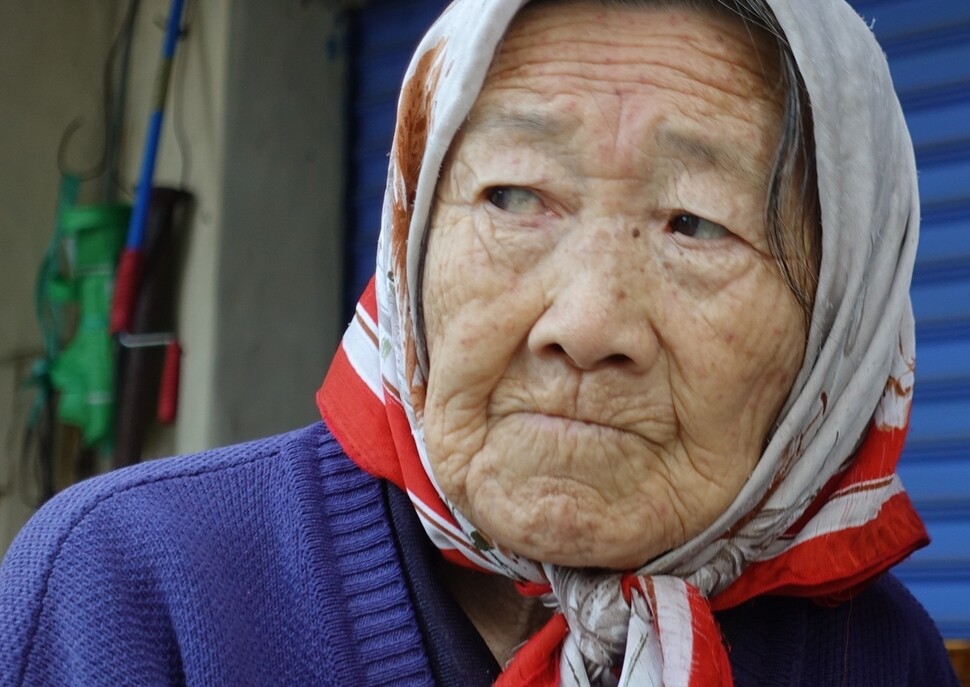
It was early fall, and the late summer heat had abated. One day in Sept. 1949, an 18-year-old newly married woman was taken to the town hall in the village of Yeonmi in Jeju township along with her mother-in-law, then 41. The Daedong Youth Corps. members escorting them shoved the young wife down into a pile of construction lumber at one corner of the hall. Placing two pieces of wood over her body, they stepped down on both sides as they interrogated her.
“Where is your husband?” they demanded.
At the time, she was in the early stages of pregnancy. Fearful that her expecting daughter-in-law might be injured, the mother-in-law tearfully pleaded with the anti-communist corps. They slapped her in the face and carried on with their vicious treatment.
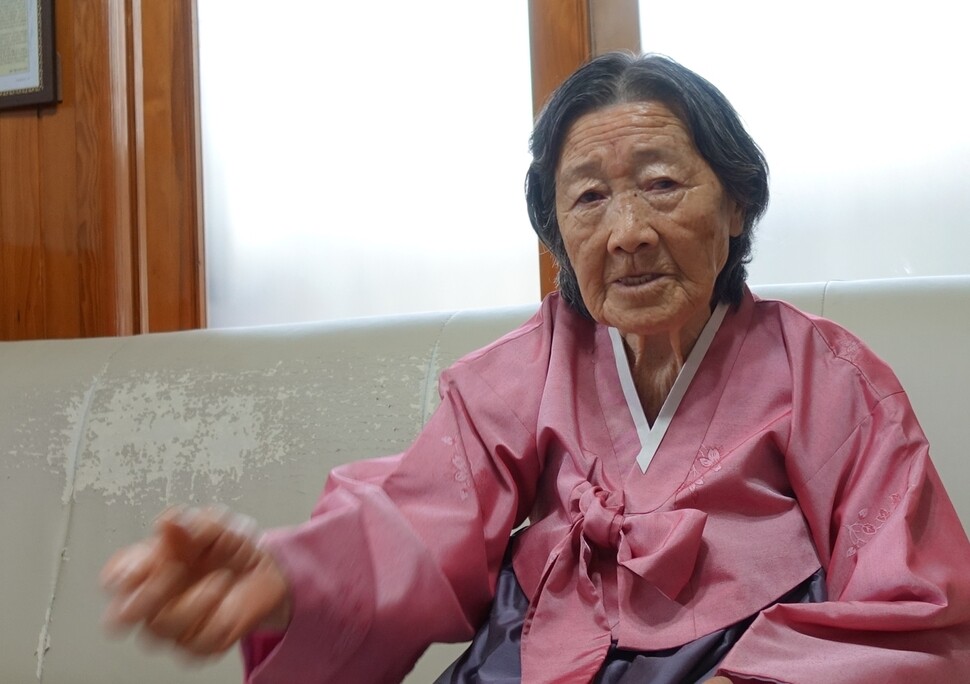
Just a simple family of farmers
Now 88 and a resident of the Yeon-dong neighborhood in Jeju City, Moon Soon-seon could still vividly recall the events that happened to her as a young wife when she met the Hankyoreh on Nov. 16. That day marked the beginning of a string of hardships that would befall three generations of family members during the Jeju Uprising of 1948–49. A native of Yeonmi Village, Moon was living in Eounul (around 800m from the village), where she had moved when she married in late 1947 at the age of 17. All of them lived together: mother-in-law Ko Nan-hyang (now deceased) in the main building, husband Song Tae-woo (then 19) and Moon in the outer building. The Songs knew of nothing except farming.
“It was around dawn. I could hear gunshots from the field to the east, and flames were burning brightly. I heard people crying. My mother ran out to the road and then told us to go hide in the bamboo grove. There was a bamboo grove around the house. My husband went and hid there, while I hid in a small room next to the kitchen. My mother-in-law told me to hide there because she said they wouldn’t be able to find the room.”
Not long afterward, she heard the voices of Daedong Youth Corps. As they searched through the house, they grilled her mother-in-law. “Where is your husband?” they asked. “Did you send him into the mountains?”
“He left for Japan over two years ago. Everyone around here knows that,” she told them. In response, they began to beat her mercilessly.
“A rioter going to Japan? That’s nonsense,” they said.
Before the events of the Jeju Uprising began, Moon’s father-in-law had left for Osaka – his home during the Japanese occupation – to find fabric for his son and daughter-in-law’s wedding ceremony. Just as they were leaving the house, the members came back and opened up the door to the small room, where they began poking with their guns. Held captive, Moon pleaded with them.
“I’m sorry. Please don’t kill me,” she said.
The members took her and her mother-in-law to the Yeonmi town hall. The brutal torture inflicted on the pregnant Moon only stopped with the arrival of three to four police officers.
The neighborhood of Ora is the setting where the US military filmed “Mayday on Chejudo” in May 1948. It was also the site of various larger and smaller incidents before the Jeju Uprising began in earnest.
To this day, Moon cannot forget the depraved acts she witnessed the Daedong Youth Corps. members committing.
“I saw it when I went inside the town hall courtyard. They were forcing old women to lie on their stomachs and having the old men climb on top of them like horses as they crawled around the courtyard. What human beings could do such a thing?” The images from that day are still burned deep in the minds of the residents taken to the town hall.
The police tied the hands of the two women and two other men and took them to the District 1 police station (Jeju Police Station).
“What brought you here?” they asked Moon.
“Have you come to attend a meeting or picked up a leaflet on the street?”
She replied, “I was sleeping when they came and took me. I’m never heard about or seen any meetings or leaflets.”
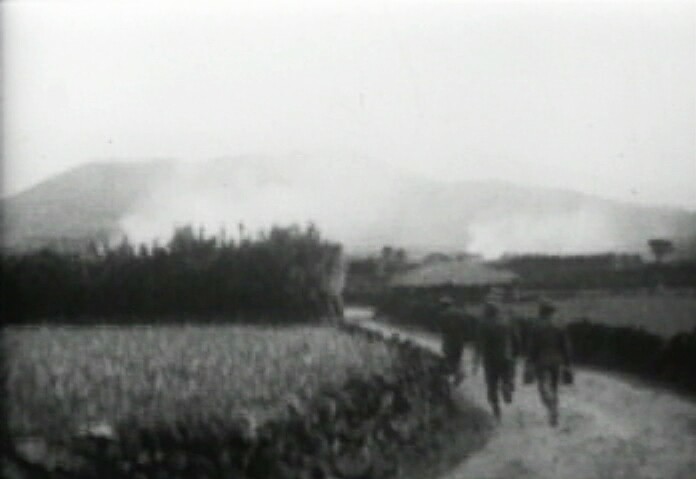
A widow at age 19
Five days after being taken to the station, Moon was freed to return to her in-laws’ home at Eounul. But she was too scared to stay there. Sometime later, the neighborhood was set ablaze by police and Daedong Youth Corps. members – Moon remembers it as somewhere around Dec. 1948. After their house burned down, the family – Moon and her husband, together with her mother-in-law and her brothers-in-law – traveled through the gardens and streams before eventually hiding around the oreum (defunct volcano) at Yeoranji. The punitive forces arrived, and others in hiding with them were killed.
“You’ll end up dead too if you keep traveling with us in tow,” mother-in-law told Moon’s husband, her oldest son. “Go somewhere and hide. Save yourself.” It was the last time Moon saw her husband. Later she heard word that he had been seen in a truck being taken to Jeju Airfield in Oct. 1949. His fate remains unknown to this day. At the age of 19, young bride Moon Soon-seon was a widow. She and her husband had been together just over a year.
Snow fell on Mt. Halla. Hearing that the punitive forces had them surrounded, the family members hurried to flee.
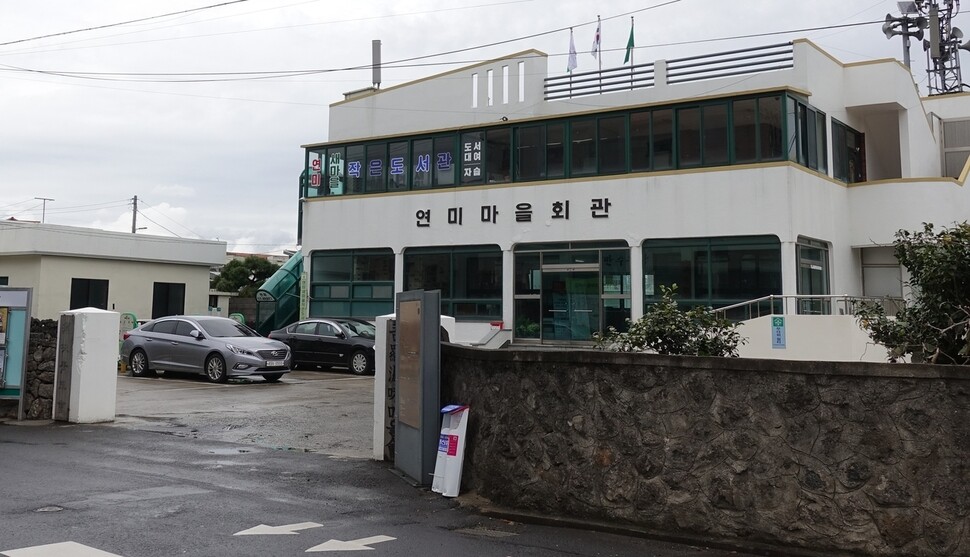
”Don’t worry about us. Save yourself”
“Don’t worry about us. Save yourself,” Ko told her daughter-in-law. On her back, she carried Moon’s brother-in-law, then four years old. Struggling to walk the snowy mountain path, her six-year-old sister-in-law said, “You go ahead. I’ll just sleep here.” The pregnant Moon continued up the mountain, carrying her sister-in-law on her back and holding her seven-year-old brother-in-law by the hand. When the punitive forces approached, they lay down in the thickets to wait out the crisis. Despite days without food, Moon did not feel the hunger – she was too terrified.
She spent 20 days on the mountain in all. Rumors spread that people who surrendered would be spared. Ko and Moon decided to turn themselves in. If they were to be killed, so be it, but they could no longer live this way – they had to leave the mountains. It was around Jan. 1949. The first place they went was a school building in the Seomun neighborhood of Jeju township.
“The Daedong Youth Corps. members summoned men came and who tore off their clothes, then had them raised their hands and walk around as they beat them with cudgels. Hearing the groaning go on and on, I didn’t think for a minute they would live. Those were the people who trusted that they would be spared if they came down. We were terrified we would end up the same way, but it didn’t end up happening.”
Moon and her mother-in-law were kept in the school building for over two weeks before being transferred to a spirits factory in Jeju City’s Geonip neighborhood. The factory served as a prison camp. Surrendered residents were either freed from there or transferred to prisons in other regions. Moon was questioned at the factory about “what she had been doing with her life to end up here,” but did not undergo any intensive interrogation. But the scene in the camp was grim, with dozens to hundreds of people shoved into a single small room. During the day, they sat close together as they passed the time; while sleeping, they could not stretch out their legs.
It was in this environment that Moon gave birth on June 6, 1949, to son Song Seung-mun, now 69. Most of the other prisoners in the room were unaware a mother was giving birth late that night.
“My mother-in-law called over a woman she knew who was in the same room. She held me tight around my waist, and the baby came out. It was a good thing – if it had gone on hurting, the other people in the room would have all woken up.”
After the baby was born, Ko took off the work pants she was wearing and wrapped them around the baby and mother. Moon was unable to drink a sip of water, let alone the seaweed soup traditionally given to Korean women who have just given birth. A man watching over the room’s door marveled at the scene. “How could someone give birth to a baby without making a sound?” he wondered. “I was wide awake and had no idea a baby was being born.”
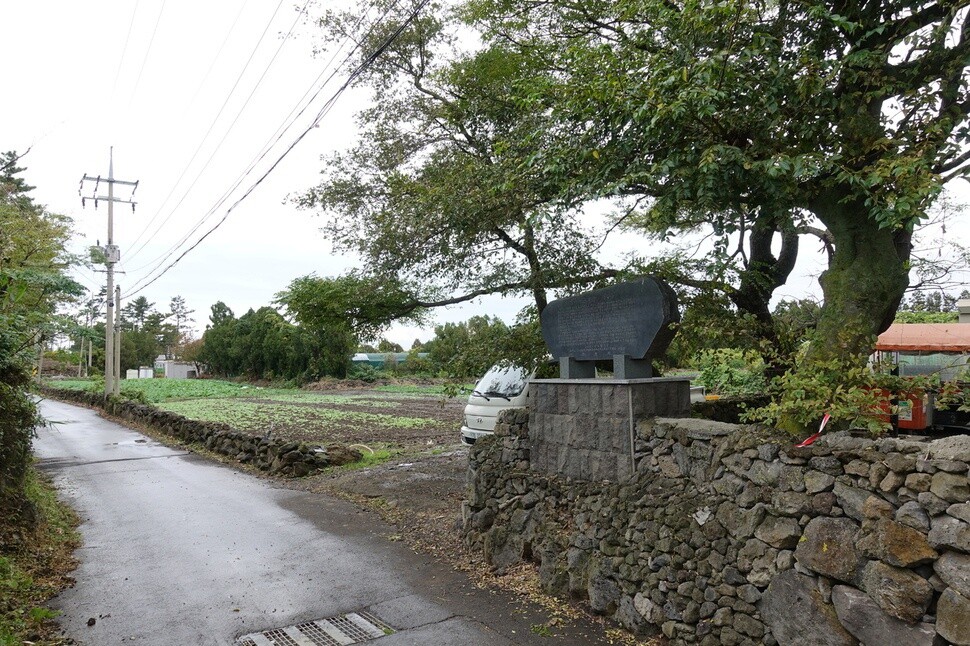
Sent to prison by mistake
Another incident happened a little over a month into Moon’s time interned at the spirits factory. In early July that year, a camp official called out her mother-in-law’s name.
“Ko Nan-hyang,” he said.
Her mother-in-law rushed over. “Yes, that’s me.”
“You’ll be going to the mainland,” she was told. Ko was dumbstruck.
“What did I do that you’re sending me to the mainland?” she pleaded, but to no avail.
Entrusting her six-year-old daughter and seven-year-old son to the care of relatives, Ko traveled to prison in Jeonju with her four-year-old in tow. A record of her court-martial ruling stored in the National Archives of Korea lists the date as July 7,1949.
Sometime later, the prison director summed Ko.
“You were brought here by mistake. The names got mixed up,” she was told. But the director did not release her.
“If you had been sentenced to something like three years, we would straighten things out and free you, but your sentence is only ten months,” he explained, suggesting that she “use the time for self-cultivation.” While in prison, Ko lost her four-year-old son to the measles.
“I was dumbfounded when they told me I’d been sent there because of a mix-up in the names,” she told Moon after being freed. “They robbed me of my body.” Her seven-year-old son, who had been left in the care of relatives in Ora, drowned while swimming in a local stream during a trip to pick mugwort.
After her mother-in-law was sent to prison on the mainland, Moon returned home from the spirits factory carrying her newborn son, but the house now lay in ruins. She ended up renting a room at her uncle’s home in the Ora neighborhood. Her mother-in-law eventually returned home and learned of the deaths of her oldest son and seven-year-old. Her second son had been staying with relatives in the city and escaped the misfortune. Moon and her mother-in-law – who had now lost three of her four sons – worked hard. They collected firewood a few kilometers from the village and sold it in town. After saving up money, they bought a field and built a house.
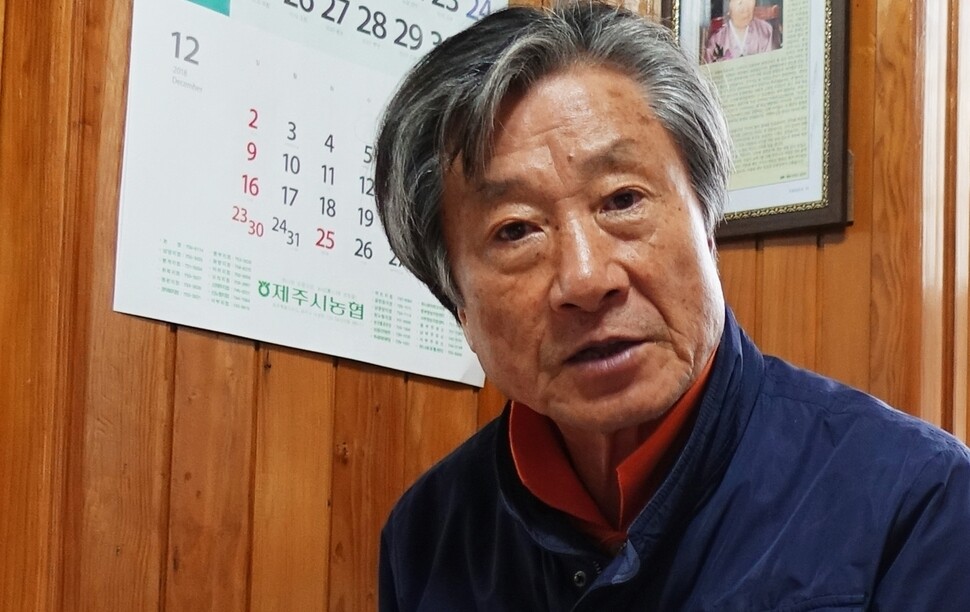
What’s the point of feeling angry?
The connection with Moon’s husband carried out to Song Seung-moon, the son born at the spirits factory. In 2007, an excavation was held to uncover secretly buried remains from the uprising near Jeju Airport. Song was on pins and needles, wondering if his father might be among the remains found – but his body was not discovered. While Song claims the guilt-by-association system has prevented him from ever finding a decent job, he has never felt any bitterness toward his father.
“It’s what I was meant to do as his son – to find his remains and honor them,” he said.
Moon Soon-seon, who as a young wife was forced to say goodbye to her husband after just a year together, asked, “What’s the point of feeling angry about what happened?”
“You just have to make sure we never see that kind of world again – that that kind of situation never happens again.”
By Huh Ho-joon, Jeju correspondent
Please direct comments or questions to [english@hani.co.kr]

Editorial・opinion
![[Editorial] Does Yoon think the Korean public is wrong? [Editorial] Does Yoon think the Korean public is wrong?](https://flexible.img.hani.co.kr/flexible/normal/500/300/imgdb/original/2024/0417/8517133419684774.jpg) [Editorial] Does Yoon think the Korean public is wrong?
[Editorial] Does Yoon think the Korean public is wrong?![[Editorial] As it bolsters its alliance with US, Japan must be accountable for past [Editorial] As it bolsters its alliance with US, Japan must be accountable for past](https://flexible.img.hani.co.kr/flexible/normal/500/300/imgdb/original/2024/0417/6817133413968321.jpg) [Editorial] As it bolsters its alliance with US, Japan must be accountable for past
[Editorial] As it bolsters its alliance with US, Japan must be accountable for past- [Guest essay] Amending the Constitution is Yoon’s key to leaving office in public’s good graces
- [Editorial] 10 years on, lessons of Sewol tragedy must never be forgotten
- [Column] A death blow to Korea’s prosecutor politics
- [Correspondent’s column] The US and the end of Japanese pacifism
- [Guest essay] How Korea turned its trainee doctors into monsters
- [Guest essay] As someone who helped forge Seoul-Moscow ties, their status today troubles me
- [Editorial] Koreans sent a loud and clear message to Yoon
- [Column] In Korea’s midterm elections, it’s time for accountability
Most viewed articles
- 1[Column] The clock is ticking for Korea’s first lady
- 2Samsung barricades office as unionized workers strike for better conditions
- 3[Editorial] When the choice is kids or career, Korea will never overcome birth rate woes
- 4[Guest essay] How Korea turned its trainee doctors into monsters
- 5Why Israel isn’t hitting Iran with immediate retaliation
- 6S. Korea, Japan reaffirm commitment to strengthening trilateral ties with US
- 7Japan officially says compensation of Korean forced laborers isn’t its responsibility
- 8[Editorial] As it bolsters its alliance with US, Japan must be accountable for past
- 9Korea, Japan jointly vow response to FX volatility as currencies tumble
- 10‘Right direction’: After judgment day from voters, Yoon shrugs off calls for change